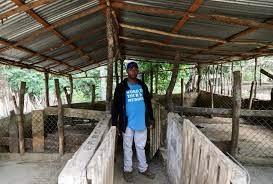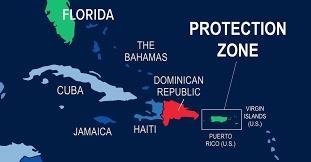 Haiti in the west and the Dominican Republic on the east of the Island of Hispaniola have experienced outbreaks of African swine fever since 1978. Since this time the infection has become endemic in both nations despite attempts at eradication with the technical and financial support of the USDA-APHIS. The program in the Dominican Republic involved an attempt to eradicate all swine by 1980. The exercise was understandably and predictably rendered futile by the persistence of African swine fever in neighboring Haiti that shares a porous border. The attempt at eradication in the Dominican Republic cost $15 million. Over $25 million was expended in Haiti in an attempt at eradication with as many as two million hogs depopulated. In addition to the losses accruing from removal of commercial and subsistence hogs, there was considerable disruption of traditional agriculture and hardship for the majority of subsistence farms relying on home-produced grain and hogs for family consumption.
Haiti in the west and the Dominican Republic on the east of the Island of Hispaniola have experienced outbreaks of African swine fever since 1978. Since this time the infection has become endemic in both nations despite attempts at eradication with the technical and financial support of the USDA-APHIS. The program in the Dominican Republic involved an attempt to eradicate all swine by 1980. The exercise was understandably and predictably rendered futile by the persistence of African swine fever in neighboring Haiti that shares a porous border. The attempt at eradication in the Dominican Republic cost $15 million. Over $25 million was expended in Haiti in an attempt at eradication with as many as two million hogs depopulated. In addition to the losses accruing from removal of commercial and subsistence hogs, there was considerable disruption of traditional agriculture and hardship for the majority of subsistence farms relying on home-produced grain and hogs for family consumption.
African swine fever was never completely eradicated in either nation and resurfaced in 2021, despite assistance provided by the U.S. in the form of technical expertise, diagnostic resources, training and cooperation with international organizations.
The major involvement of the U.S. should be to encourage containment of African swine fever to Hispaniola and prevent extension to Puerto Rico with the evident potential to extend to the U.S. This is exemplified in the efforts of Dr. Amy Delgado, Director of the APHIS Center for Epidemiology and Animal Health and her team.
The infection has resulted in the Dominican Republic, previously 60-percent self-sufficient in pork production having to import 70 percent of requirements following loss of a substantial portion of the Nation’s herd. Despite the superior organization and veterinary resources in the Dominican Republic compared to neighboring Haiti, ASF is impossible to control. Eradication is only a distant aspiration.
 The presence of endemic ASF in the Dominican Republic should serve as a lesson to APHIS that it is impossible to eradicate an endemic highly infectious disease of livestock. Including vaccination as a component of control will reduce the risk to the U.S and Caribbean nations. Vaccines against ASF are now deployed in Vietnam, the Philippines and China among other nations. It is questioned why a USDA- ARS vaccine was not deployed in Haiti and the Dominican Republic.
The presence of endemic ASF in the Dominican Republic should serve as a lesson to APHIS that it is impossible to eradicate an endemic highly infectious disease of livestock. Including vaccination as a component of control will reduce the risk to the U.S and Caribbean nations. Vaccines against ASF are now deployed in Vietnam, the Philippines and China among other nations. It is questioned why a USDA- ARS vaccine was not deployed in Haiti and the Dominican Republic.
It is difficult to understand why the USDA is reluctant to consider vaccination as a component of control of a catastrophic disease and is so intent on following a playbook that is inappropriate to the real world situation. Creating a solidly immune population of hogs within 100 miles of the common border with Haiti and implementing region-by-region quarantines in the Dominican Republic with extension of vaccination through the entire nation will be less expensive and hopefully more productive than eradication over and over again.
Middle East nations are now deploying vaccination to control foot and mouth disease and Mexico, Egypt, France and the Netherlands are using available avian influenza vaccines as components of their respective programs. The U.S. poultry industry and APHIS had best get their figurative ducks in a row and reconsider introducing alternatives to mass depopulation as the current sole control measure for avian influenza.